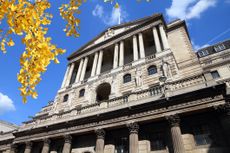What is inflation and how will it affect you?
Inflation has remained stubbornly high, with a predicted fall not materialising. What is inflation and what does high inflation mean for you and your finances?


Stubborn inflation has underpinned much of the UK’s economic woes over the past 12 months and it would appear that households will have to wait to see meaningful relief on household budgets.
High food prices and early summer spending on holidays and entertainment kept inflation at 8.7% last month – higher than many economists predicted.
The sticky period of inflation encouraged the Bank of England to continue hiking interest rates when it last met, taking the base rate to 5%.
Subscribe to MoneyWeek
Subscribe to MoneyWeek today and get your first six magazine issues absolutely FREE

Sign up to Money Morning
Don't miss the latest investment and personal finances news, market analysis, plus money-saving tips with our free twice-daily newsletter
Don't miss the latest investment and personal finances news, market analysis, plus money-saving tips with our free twice-daily newsletter
Britain’s inflation problem is proving increasingly difficult to curb, with core inflation, which removes the more volatile items such as food and energy from the calculations, rising sharply to 7.1% - the highest in 31 years.
“Although inflation is on track to fall rapidly in the second half of the year, as energy prices continue to decline and food inflation eases back slowly, the fear is that interest rate rises may not be enough to tame persistently high inflation,” says Alice Haine, personal finance analyst at Bestinvest.
“This could leave Prime Minister Rishi Sunak in very hot water as failure to meet his January pledge to halve the rate of inflation by the end of 2023, from the 10.7% it stood at when he made the promise, will not bode well with a General Election looming next year,” she adds.
On the back of the announcement, mortgage lenders have been upping rates with the average two-year fixed rate mortgage and the average five-year fixed rate mortgage now above 6%, leading to some customers facing additional costs of more than £7,000 per year.
“The hotter-than-expected inflation data accelerated the frenzy, as it signalled the BoE would have to lift interest rates even higher,” Haines adds.
Consumer inflation has been eating away at wages and purchasing power. According to Kantar shoppers are facing an increase of £800 to their annual grocery bills despite a fall from record highs earlier in the year.
Energy bills, council tax bills, and petrol prices have also increased. In fact, you’d be hard-pressed to find something that isn’t costing more this year than it was last year.
If all these figures seem confusing, you’re not alone. The headline inflation figure is just a number – inflation affects different people in different ways.
So, how is inflation calculated? Will it continue to go up? And, most importantly, how does it affect you?
Will inflation fall?
The latest round of statistics came as a shock to many economists and forecasters who had been predicting a turning point in the UK’s economic outlook.
Still, the Bank of England anticipates inflation to fall steeply over the coming months, reaching its target of 2% by the third quarter of 2024.
But the International Monetary Fund (IMF) predicts inflation won’t return to the 2% target until mid-2025, however, it did bring its forecasted date forward by six months from its April prediction.
But in the shorter term, consumers are still facing challenges. “Inflation had been expected to fall – at least a bit – but it hasn’t obliged,” says Danni Hewson, head of financial analysis at AJ Bell.
“There is a tiny bit of good news hidden in this troubling update from the ONS and that’s the rate at which food prices are rising, which has slowed, but it will be little comfort to all those facing huge increases in their monthly mortgage payments.
“Savings cushions have been eroded over the past year and there will be many households facing the real prospect of being unable to keep paying for the roof over their heads.
“And these inflation numbers show the Bank of England still has a big job to do if they’re to root out the inflation which seems to have become embedded in the very fabric of our economic lives.”
Looking ahead, the prospect of a swift end to high inflation is becoming more distant, with the consequences set to hamper households’ spending and saving ability.
“We were warned that the medicine required to cure our inflationary ailment would taste foul, but the reality is proving more unpalatable than many had expected,” Hewson adds.
How is inflation calculated?
In the UK, the Office for National Statistics (ONS) keeps track of the prices of a range of items in a “basket” of goods and services made up of over 700 things people regularly purchase.
The overall price of that basket is known as the Consumer Prices Index, or CPI. To calculate inflation CPI is compared to what it was a year ago, and the change in the price equals the change in the rate of inflation.
Other measures of inflation, such as the Retail Price Index (RPI) and Consumer Prices Index including owner occupiers' housing costs (CPIH) use the same method but different inputs. That’s why they tend to have a different reading than CPI.
However, CPI is the most commonly used and widely accepted metric.
Will inflation continue to rise?
The Office for Budget Responsibility (OBR) estimates inflation will fall to 2.9% by the end of 2023.
The cost of energy has already begun to fall. In his Spring Budget, Jeremy Hunt announced he was extending the Energy Price Guarantee until July, meaning households’ energy bills will stay at £2,500 until then instead of jumping to £3,000 from April.
The new energy price cap, set by Ofgem, has seen average energy bills fall to £2,074 in July, thanks in part to falling wholesale prices. This is a factor that could kickstart a fall in inflation in some areas of the economy, says Myron Jobson, senior personal finance analyst at interactive investor.
“Businesses will also benefit from a reduced cost burden from lower gas and electricity prices which should eventually feed into lower core inflation. But prices remain far higher than Britons want and need them to be to maintain financial resilience, and strong wage growth is likely to keep inflation elevated high throughout this year.
“Put simply, while glimpses of the light at the end of the tunnel can be seen, the road back to normal remains a long, winding, and uncertain one,” he says.
How does inflation affect you?
Rising prices will affect your budget, and potentially reduce the number of things you can afford.
Furthermore, rising interest rates will also mean mortgage repayments will be more expensive.
However, rate rises do mean good news for savers, who might want to think about storing their cash in a savings account with a fixed rate while they have the chance.
We have compiled a list of the best savings accounts available right now. They’re currently sitting at up to 7%, which is far higher than they have been in recent years.
With contributions by Tom Higgins
Nic studied for a BA in journalism at Cardiff University, and has an MA in magazine journalism from City University. She joined MoneyWeek in 2019.
-
-
 Top-quality small companies with big scope for long-term growth
Top-quality small companies with big scope for long-term growthA professional investor tells us where he’d put his money. This week: Dr Gareth Blades, analyst at Amati Global Investors, highlights three favourites.
By Nicole García Mérida Published
-
 Starling Bank hikes fixed savings rate to 5.25%
Starling Bank hikes fixed savings rate to 5.25%Starling Bank has hiked the rate on its fixed savings which has shot up from 3.25% to 5.25% - but how does it compare to the rest of the market?
By Vaishali Varu Published
-
 Bank of England raises interest rates to 5.25%
Bank of England raises interest rates to 5.25%The Bank has hiked rates from 5% to 5.25%, marking the 14th increase in a row. We explain what it means for savers and homeowners - and whether more rate rises are on the horizon
By Ruth Emery Published
-
 UK wage growth hits a record high
UK wage growth hits a record highStubborn inflation fuels wage growth, hitting a 20-year record high. But unemployment jumps
By Vaishali Varu Published
-
 UK inflation remains at 8.7% ‒ what it means for your money
UK inflation remains at 8.7% ‒ what it means for your moneyInflation was unmoved at 8.7% in the 12 months to May. What does this ‘sticky’ rate of inflation mean for your money?
By John Fitzsimons Published
-
 VICE bankruptcy: how did it happen?
VICE bankruptcy: how did it happen?Was the VICE bankruptcy inevitable? We look into how the once multibillion-dollar came crashing down.
By Jane Lewis Published
-
 Would a food price cap actually work?
Would a food price cap actually work?Analysis The government is discussing plans to cap the prices of essentials. But could this intervention do more harm than good?
By Nicole García Mérida Published
-
 What is Warren Buffett’s net wealth?
What is Warren Buffett’s net wealth?Features Warren Buffett is one of the world’s richest people. But how did he make his money?
By Jacob Wolinsky Last updated
-
 The cost of petrol in the UK compared with the rest of the world
The cost of petrol in the UK compared with the rest of the worldNews The price of petrol in the UK went through the roof last year, but has since settled. We look at how UK petrol price compares with the rest of the world.
By Tom Higgins Published
-
 What is Rihanna's net worth?
What is Rihanna's net worth?Features Rihanna became the youngest self-made billionaire in 2022. Here’s how she made her money.
By Jacob Wolinsky Published









